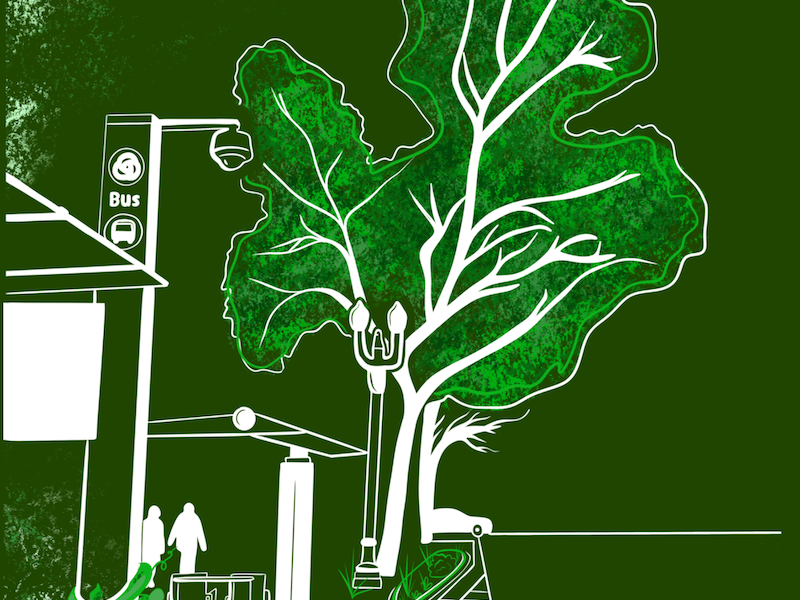It’s 2023 and we’re starting off Vanguard’s Greenspace series with a story on how Portland State’s students can be a part of the greener good through a program called Greenstreet Stewards. The program, which is organized by Portland’s Bureau of Environmental Services, is designed to allow community members to take part in the care and maintenance of Portland’s green streets.
“It started in 2010 and it was created as a 6-month pilot project in a targeted area in north Portland,” said Svetlana Hedin, a Green Street Steward manager at Portland’s Bureau of Environmental Services. According to Hedin, the Bureau had just installed a system of “bioswales,” which are drainage ditches filled with grasses and vegetation. When contaminated rainwater runs through the ditches, the bioswales are designed to filter out pollution.
According to Hedin, the Green Street Stewards program came out of the community’s response to the new bioswales in their neighborhoods. “We sent out letters to people just letting them know that we created lots of bioswales or green streets,” Hedin said. “Then we got replies from people [saying], ‘well can we actually look after them? Can we do stuff with them?’ We said, ‘well, why not?’ And so that’s how the program got its feet under them.”
The Bureau responded by enlisting the community in the upkeep of the bioswales. The program was enough of a success that Hedin said they replicated it elsewhere around the city. “By 2012—so two years later—the [bioswale] program was city-wide,” she said. “We then incorporated communities to look after them as well.”
Hedin emphasized the importance of the bioswales themselves, which are the green infrastructure that the volunteers are maintaining. “The green street planters are all rain gardens, so all of those things collect stormwater runoff from the street and sidewalk and then manage that stormwater on sight,” she said. “Basically it captures that stormwater, it slows it down and filters the stormwater runoff from streets and sidewalks. They help keep stormwater and pollutants out of our waterways and that reduces the risk of sewer backups into the streets and basements.” The stewardship program takes place all around the city, not just downtown, with over 2,400 bioswales.
When asked how a PSU student can sign up for the program, Hedin said that it was open for all. “Anybody can sign up for a project,” said Hedin, who is also a PSU alumni. “Anyone can be a steward. It’s pretty easy. Anybody’s invited. It’s a voluntary basis, and people can sign up online … and they can adopt any stormwater planter near their homes, or even PSU has multiple ones.”
“Portland is known to take action to help protect our rivers and streams by volunteering to plant trees, remove pavements, you know, with depaving or building rain gardens or clean up along streams and all sorts of things,” Hedin continued. “Students definitely can participate and if they want to do it as a volunteer project for Capstone or whatnot, or if they need to fulfill some sort of hours, then we can sign off on those too. They would be responsible for managing their own hours and going at the time that is convenient for them.”
The program activities are not organized by anyone in particular—it’s up to the volunteers to decide when they’d want to tend to the stormwater facilities. This allows for a more flexible schedule, a potential boon for busy PSU students. In addition, there are no allocated times for stewards to work. “Any time it’s convenient for you, but we want to encourage people to go during the day… because there’s green infrastructures located by the roads so we want to make sure that you are visible,” Hedin said. “So we do provide safety vests and gloves and grabbers for people to pick up garbage with—so safety is our priority. If it’s dark and you don’t feel like going, then we do not want you to be there.”
The most active times of the year in the program are the seasons of spring and fall. “Spring because… people have been cooped up at home for the whole time of the winter and they want to come out and do something fun and exciting and dig in the dirt, and so people get really excited,” Hedin said. “Fall because the leaves fall down and so there is a lot more debris and people are more conscientious that there are leaves maybe even in the storm drains… by the end of each block there are storm drains, so people might remove those storm drains and they’ll notice that ‘hey, there is a green infrastructure next to that storm drain, why don’t I clean up that too?””
The Green Street Steward program, as widespread as it is throughout the city, finds it important to record activities within the program to track how much debris is generated in different areas throughout the city. “We ask people to report their activities so we know how much time people actually spend in different areas of Portland, and how much garbage do they collect and how many buckets of yard debris—you know, leaves and sticks and so on—but it’s very hard to get that information from people,” Hedin said. She then emphasized the importance of a volunteer logging their information. “Maybe there is this particular weed that is obnoxious and people are constantly going after it, and then… boom, it’s not there anymore, so we can see that hey, this works actually, whatever this person is doing is great,” she said. “But the other reason is that we collect the data and then at the end of the year we provide awards for people that remove the most debris or most trash or spend most time at the facility doing these activities… we provide a little something for people. We will write an actual certificate and give people certificates.”
As for the challenges faced within the program, Hedin emphasized the difficulty of transporting debris. “I think the biggest challenge is that when people collect yard debris or litter, most people… can drop it in their garbage can and that’s no problem,” Hedin said. “But if they’re volunteering, let’s say… half a mile away from their home, it’s not necessarily easy for them to carry a lot of litter with them… so that’s probably the hardest thing.”
Hedin indicated that getting people to volunteer as stewards does not appear to be hard. When asked why Hedin thinks that volunteers are eager to jump at the opportunity, she emphasized the desire to feel good about volunteering. “You can do something with the green infrastructure in front of your home,” she said. “You can just come out and pick up garbage and clean the leaves from the openings so the water can get in so that the facility can function and… it feels good! You know? It’s simple enough.”
Portlanders who are interested in volunteering with the Green Street Stewards program can do so at the Green Street Stewards page of Portland.gov.






